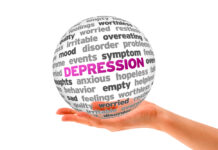An article published in New Ideas in Psychology hypothesizes that mental health awareness efforts in Western countries may be partially responsible for the rise of mental health problems those countries are experiencing. Psychologists Lucy Foulkes from the University of Oxford in the UK and Jack Andrews from the University of New South Wales in Australia wrote the article.
Foulkes and Andrews argue that the increase in mental health problems in places pushing greater mental health awareness likely involves at least two precipitating factors. First, more people with mental health problems accurately report symptoms that would have been under-reported, ignored, or dismissed if not for greater mental health awareness. Second, some people with mild forms of distress incorrectly interpret their experience as a mental health problem.
According to the authors, the latter case can lead to mental health problems that would have otherwise not existed due to the power of labeling. They write:
“First, we argue that mental health awareness efforts are leading to more accurate reporting of previously under-recognized symptoms, a beneficial outcome. Second, and more problematically, we propose that awareness efforts are leading some individuals to interpret and report milder forms of distress as mental health problems. We propose that this then leads some individuals to experience a genuine increase in symptoms because labeling distress as a mental health problem can affect an individual’s self-concept and behavior in a way that is ultimately self-fulfilling.”
 The current work aims to lay out what the authors call “The Prevalence Inflation Hypothesis.” Namely, that increased mental health awareness efforts lead to improved recognition of mental health problems as well as overinterpretation of mild distress as a mental health problem. This results in increased rates of mental health problems, leading to more awareness efforts. The result is a self-perpetuating cycle of increased efforts at mental health awareness, leading to increased mental health problems in the populations exposed to these awareness efforts.
The current work aims to lay out what the authors call “The Prevalence Inflation Hypothesis.” Namely, that increased mental health awareness efforts lead to improved recognition of mental health problems as well as overinterpretation of mild distress as a mental health problem. This results in increased rates of mental health problems, leading to more awareness efforts. The result is a self-perpetuating cycle of increased efforts at mental health awareness, leading to increased mental health problems in the populations exposed to these awareness efforts.
The authors explain that the first factor, improved recognition of mental health problems, is a positive thing. As society makes efforts at mental health awareness, the stigma around these diagnoses declines, and mental health literacy improves. The result is many people seeking help for conditions that would have been overlooked or not disclosed in the past. This could reduce suicide deaths and give researchers a more accurate view of the prevalence of mental health problems.
The second factor, the overinterpretation of mild distress as a mental health problem, leads to mental health issues that likely would not have existed otherwise. As mental health awareness increases, people may begin to incorrectly identify transient distress and “problems of living” as mental health problems.
Many awareness campaigns call on individuals to notice and seek help for negative psychological experiences while encouraging the use of psychological language around these experiences.
Self-diagnosis due to increased mental health literacy can cause people to misinterpret mild distress as a mental health problem. This interpretation can change their behavior and self-concept, thereby minting a mental health problem that would have otherwise been a normal, transient episode of distress. This leads to incorrect labeling of mild distress as mental health problems and exposes people to unnecessary treatment and a self-fulfilling overidentification with psychiatric labels.
The authors argue that this could turn mild, transient distress into a permanent fixture in people’s lives. Additionally, the emphasis on noticing, labeling, and psychiatric language may exacerbate some people’s existing mental health problems.
The current work presents several pieces of evidence for the existence of the overinterpretation problem. Randomized control trials have shown that brief group therapy after a traumatic event can increase PTSD symptoms compared to no treatment. Similarly, students that learned the principles of cognitive behavioral therapy in school showed more internalizing problems (depression, anxiety, etc.) than those that did not.
Research has shown that cognitive behavioral therapy, which encourages people to identify negative thoughts, can lead to more negative thoughts and make participants that otherwise had a positive outlook feel worse. There is also evidence that telling a person they are experiencing symptoms, even incorrectly, leads to them reporting more of those symptoms. For example, one study falsely told participants that they had high blood pressure. Those participants subsequently reported more symptoms associated with high blood pressure.
The authors propose that the prevalence inflation hypothesis should be empirically tested. One way of doing this might be to assess the relationship between mental health terminology used in media (indicating increased awareness) and rates of mental health problems. They also suggest that qualitative studies could assess mental health outcomes for people that receive awareness-raising information versus those that do not. Qualitative work could also explore how awareness efforts affect how people understand their negative psychological experiences and the language they use around those experiences.
Finally, the authors suggest that awareness campaigns should consider how they can mitigate overinterpretation. They recommend that awareness efforts should fully consider the consequences of overinterpretation by implementing strategies to measure and report it.
“Overinterpretation is problematic and describes how awareness efforts have led some individuals to over-pathologize common psychological experiences,” Foulkes and Andrews conclude.
“In some cases, this has become a self-fulfilling prophecy: interpreting difficulties as a mental health problem can lead to changes in self-concept and behavior that ultimately exacerbate symptoms and distress. Lastly, the prevalence inflation hypothesis states that the relationship between mental health awareness efforts and increasing rates of mental health problems is cyclical and escalating. This is an urgent hypothesis that requires empirical testing, and careful research efforts are needed to understand how future awareness campaigns can minimize the occurrence of overinterpretation.”
Other researchers have argued that mental health awareness campaigns exploit schoolchildren by essentially turning their teachers and social workers into stimulant, antidepressant, and antipsychotic salespeople. Another problem around mental health awareness concerns the shortage of options for people seeking care in many places.
Research has shown some anti-stigma campaigns to be ineffectual. Anti-stigma campaigns may also hinder withdrawal from dangerous psychotropic medications. However, awareness campaigns can also have positive impacts. One study showed that an awareness campaign aimed at LGBTQ+ youth increased feelings of empowerment and solidarity.
****
Foulkes, L., & Andrews, J. L. (2023). Are mental health awareness efforts contributing to the rise in reported mental health problems? A call to test the prevalence inflation hypothesis. New Ideas in Psychology, 69, 101010. https://doi.org/10.1016/j.newideapsych.2023.101010 (Link)















Never underestimate the power of words.
Report comment
Removed at request of poster.
Report comment
The mental illness industry is exactly that, as it’s misuse of language has infected an entire generation.
Report comment
Removed for moderation.
Report comment
I believe that this article clearly explains the paradox regarding people’s access & exposure to rhetoric labeled by authors/sources as “evidence-based, scientific, & clinical”, & how it offers an easy conclusion/”remedy”…giving our culturally groomed trust to anyone (especially) writing a prescription for….psych drugs.
I was one of those people in 2004 (the bipolar gold-rush) & paid a terrible price, finally clawing back my identity & health-body & soul- developing an expanded warrior-like perspective of the world, that has protected me from other forms of gaslighting & auto-pilot trust.
No paranoia here-I KNOW there are entities that don’t have my well-being as a priority…& have learned to ACT against them…& sometimes I still lose.
Without enormous resources for healthcare, folks will often turn to what is seemingly expedient, as getting back to ‘work’ is paramount in global culture.
Grooming/marketing by the psych-industry, catastrophizing life forward…without THEM (OhNo!)…is the cynical double-speak that simultaneously encourages a trusting bond (WE understand you) & strips you of sober, independent assessment of the relationship…& yourself. It encourages an approval & brand of self-pity that makes the industry’s ‘rescue’ all the more emotionally appealing. It is, after all, what they do-spin it.
Sanctified/approved-by-‘experts’ addiction is OK now.
ALL drug addiction turns people into permanent victims….the industry sponsors the faux ‘fight’ against stigma, positioning itself as the client’s champion (THEY don’t understand you; WE do).
The client is told over & over they will fail (or suicide) without this ‘relationship’ (drugs).
And THAT is the definition of a self-fullfilling prophecy, as withdrawal CAN kill.
Psychiatry’s business model is genius; defining their customers (everybody, per the DSM), AND supplying the culturally-accepted ‘fix’ FOR LIFE (drugs)…..& positioning themselves as the ONLY authority accepted by the courts.
Yikes.
All this for alot of transitional distress AND profound human suffering.
Defining EVERTHING as profound, acute, chronic, LIFE-LONG illness has reaped trillion$.
I believe a ‘seige mentality’ has been successfully adopted/marketed to generations post WW II…Yeah, life was difficult AND different for every generation…it’s not a contest.
But if you lack perspective-HISTORY-you think it’s worse for you. And schools don’t teach history anymore. Some are prohibited.
Double Yikes, Florida!
Perspective…..Ask Ukranians stuck in Kiev, or Ugandans, or women in Iran, or……
Report comment
Increased awareness of mental health issues also causes doctor to overreact to certain behaviors or to mistake other issues for mental health issues. I was extremely fatigued. My doctor immediately stated I had major depressive disorder. Never asked any questions required to appropriately assess depression. Thankfully, was a psychiatric nurse and knew the symptoms of depression and knew that the doctor was wrong. She became upset that I didn’t accept her diagnosis and prescription for an antidepressant. I pointed out where she was wrong in her assessment. I pushed her for a blood test including B12. Turns out my B12 was extremely low. My B12 was treated successfully, but this doctor still would not let go of her initial assumption of MDD. When I would get frustrated with her confirmation bias, she said I had Bipolar Disorder because I was irritated with her. I went for a psych evaluation just to please her. Thankfully, the psychiatrist’s diagnosis was unspecified anxiety and suggested I get a new general practitioner.
Report comment
Doctors who rely on the DSM are completely irrational.
Report comment
Aspie63-famliar with that scenario as I also carried ‘Unspecified & NOS’…
If you’ve never read DR. Leonard Sax on the topic (WSJ-2013), you might enjoy this.
Funny, pithy, scalding critique in human terms.
A sample….
“Over the past two decades, American culture has made almost any deviation from a continual smiley face into a psychopathology, especially for children.”
https://www.leonardsax.com/unspecified-mental-disorder-thats-crazy/
Report comment
It seems the “Invasion of the Body Snatchers” or “The Stepford Wives” is the psychiatric definition of “mentally healthy!”
Report comment
Exposing children and adolescents to notions of “mental health awareness” is totally inappropriate because it makes them think there’s something wrong with them for not feeling their best at all times; they’re too young to have perspective about their feelings. It’s a grossly irresponsible use of the power of suggestion.
Children need to know that feelings are a part of living, and be taught how to respond to their feelings in positive, self-affirming ways. Anything else is confusing and harmful.
Report comment